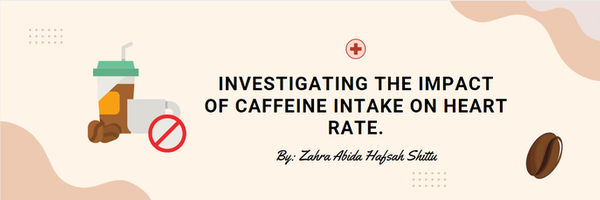Investigating the impact of caffeine on heart rate
Grade 7
Presentation
Hypothesis
We hypothesize that when people consume soda, coffee, or tea that has caffeine, their heart rate will increase temporarily. This could happen because caffeine stops adenosine, a neurotransmitter that helps us relax and sleep. So, when adenosine is blocked, our sympathetic nervous system gets more active, releasing adrenaline and making our cardiovascular system more excited. In simpler words, there is a relationship between diverse doses of caffeine intake and individuals' heart rates.
Research
A research done by the National Institute of Health, suggests that caffeine does indeed, increase heart rate. This is because caffeine is a stimulant that can increase heart rate by energizing the nervous system. Typically, it can cause an increase of about 3-10 beats per minute (BPM) in most people.
Let's talk about what caffeine does to the brain. Caffeine is like a boost for your brain and nerves. It makes them more active. It also increases the flow of chemicals like adrenaline. In small amounts, caffeine can make you feel focused and refreshed. It's good to have a reasonable amount for the best effects. Caffeine not only helps send messages in the brain but is also connected to better mood and thinking skills. That's why many people use it to stay alert. Just remember, too much caffeine can be a problem, so it's wise to not overdo it.
Variables
Based on our hypothesis, the independent variable is the diverse doses of caffeine intake, and the dependent variable is individuals' heart rates. The individuals' heart rates are measured and expected to change as a result of the variations in the diverse doses of caffeine intake.
Procedure
Before the experiment begins, measure each participant's baseline heart rate and record it then give them a measure amount of caffeine, after 30 mins test their heart rate and record it.
Observations
Our study found that drinking caffeine, like coffee or tea, raised heart rates in different age groups. The 15-17 age group showed the most significant increase, indicating they might be more sensitive to caffeine. The results support the idea that caffeine temporarily stimulates the heart. It's crucial for everyone, especially those with health concerns, to be cautious about caffeine intake. The study sheds light on how everyday substances, such as caffeine, affect our bodies, particularly in younger individuals.
Analysis
We discovered a noticeable increase in heart rate after caffeine consumption bye my family. This observation suggests that caffeine has a stimulatory effect on cardiovascular activity. Our findings contribute to a growing understanding of how commonly consumed substances, such as caffeine, can influence physiological processes in the human body, providing valuable insights for future investigations and discussions about the health effects of everyday substances. In addition, we noticed that the most affected age group after caffeine consumption was the 15–17-year-old age group.
Conclusion
Caffeine is like a boost for your brain that can speed up your heart. It does this by blocking certain signals in your brain and making your heart beat faster. If you're used to it, the effect might not be as strong. But too much caffeine can still cause your heart to race. It's important to be mindful of how much caffeine you consume. If you have health issues, it's a good idea to be careful. Just remember, don't overdo the caffeine, and pay attention to how your body feels after consumption. Furthermore, it is safe to say that our hypothesis was correct due to the research we conducted.
Application
In light of the preceding analysis and findings, we determined that it is imperative for people to be cognizant of what caffeine can cause. We hope that this science fair project will spread awareness about caffeine, and what it can do.
Sources Of Error
Next time we compete in the science fair, one of the changes we would like to do, is have a bigger number of participants for the experiment. Other than that, I believe we did good.
Citations
- https://slidesgo.com/theme/biophysics-specialized-academy#search-academy&position-2&results-44&rs=search
- https://hawaiicoffee.com/most-caffeinated-countries/
- https://www.healthline.com/health/caffeine-effects-on-body
- https://www.ncbi.nlm.nih.gov/books/NBK209050/
- https://www.betterhealth.vic.gov.au/health/healthyliving/caffeine
- https://www.premiercardiology.com/blog/could-your-racing-heart-be-caused-by-caffeine
- https://www.houstonmethodist.org/blog/articles/2021/oct/caffeine-sleep-how-long-does-caffeine-keep-you-awake/
- https://www.sciencedirect.com/science/article/pii/S0149763416300690
- https://www.mdpi.com/2072-6643/14/21/4696
- https://www.caffeineinformer.com/tim-hortons-coffee-caffeine-content
- https://www.ncbi.nlm.nih.gov/pmc/articles/PMC5658389/
Acknowledgement
We acknowledge Mrs. Nambiar for helping us figure things out, and to everyone who participated in our experiments. There support and involvement made a difference in making our project better!

